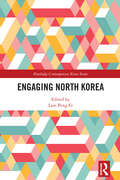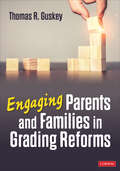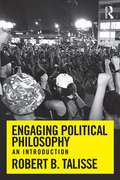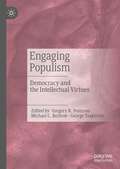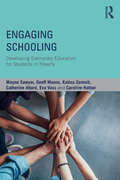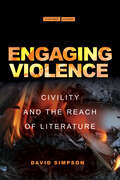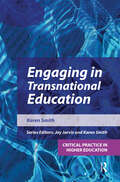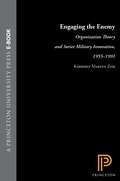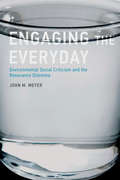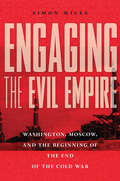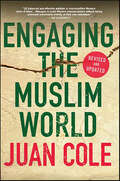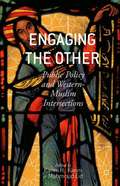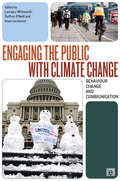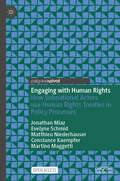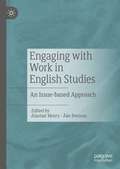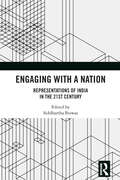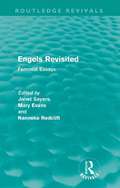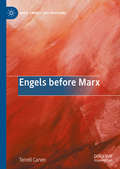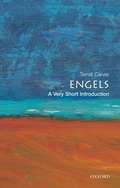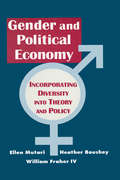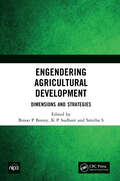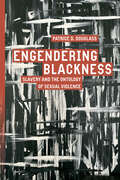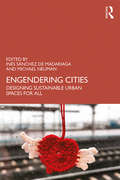- Table View
- List View
Engaging North Korea (Routledge Contemporary Korea Series)
by Lam Peng ErThis book presents a comprehensive overview of international attempts to engage North Korea diplomatically with the aim of avoiding a nuclear war.It highlights the difficulty of this task, concluding that the containment of North Korea currently depends more on military deterrence than on diplomatic restraint. It considers the various multilateral attempts at diplomatic engagement over recent decades and explores the different approaches of different countries, examining the domestic factors and the strategic interests which drive different countries’ different approaches. It includes an account of China’s growing estrangement, Russia’s increasing closeness, and the surprising relationship between North Korea and Sweden which has been effective in providing the North Korean people with humanitarian aid.Revealing the story of diplomatic frustrations and failures when engaging North Korea, this book will appeal to students and scholars of Korean studies, Asian politics, and international relations.
Engaging Parents and Families in Grading Reforms
by Thomas R. GuskeyImprove grading practices with support from families Educators seeking to transform age-old grading practices face numerous challenges, particularly when it comes to gaining support from students’ families. This practical guide from a world-renowned expert on grading and assessment practices offers concrete strategies to turn parents and families into trusted partners in grading reform efforts. The book enables educators to anticipate, understand, and effectively address families′ concerns over grading reforms and build trust through authentic engagement. With clear and actionable strategies that educators can implement right away, the easily digestible chapters unpack the complexities of the change process, clarify the purpose of grading, and show how to enhance the use of computerized grading programs. Other features include: Strategies to ease opposition to grading reform from parents and families Insights into how to improve report cards Guidance on how to effectively communicate student performance with parents and families A must-have resource for educators navigating the challenging journey of grading reform, Engaging Parents and Families in Grading Reform is a comprehensive guide to grading reform that emphasizes family engagement to ensure success.
Engaging Parents and Families in Grading Reforms
by Thomas R. GuskeyImprove grading practices with support from families Educators seeking to transform age-old grading practices face numerous challenges, particularly when it comes to gaining support from students’ families. This practical guide from a world-renowned expert on grading and assessment practices offers concrete strategies to turn parents and families into trusted partners in grading reform efforts. The book enables educators to anticipate, understand, and effectively address families′ concerns over grading reforms and build trust through authentic engagement. With clear and actionable strategies that educators can implement right away, the easily digestible chapters unpack the complexities of the change process, clarify the purpose of grading, and show how to enhance the use of computerized grading programs. Other features include: Strategies to ease opposition to grading reform from parents and families Insights into how to improve report cards Guidance on how to effectively communicate student performance with parents and families A must-have resource for educators navigating the challenging journey of grading reform, Engaging Parents and Families in Grading Reform is a comprehensive guide to grading reform that emphasizes family engagement to ensure success.
Engaging Political Philosophy: An Introduction
by Robert B. TalisseEngaging Political Philosophy introduces readers to the central problems of political philosophy. Presuming no prior work in the area, the book explores the fundamental philosophical questions regarding freedom, authority, justice, and democracy. More than a survey of the central figures and texts, Engaging Political Philosophy takes readers on a philosophical exploration of the core of the field, directly examining the arguments and concepts that drive the contemporary debates. Thus the fundamental issues of political philosophy are encountered first-hand, rather than through intermediary summaries of the major texts and theories. As a result, readers are introduced to political philosophy by doing philosophy. Written in a conversational style, Engaging Political Philosophy is accessible to students and general readers. Instructors can use it in the classroom as a stand-alone textbook, a complement to a standard collection of historical readings, or as a primer to be studied in preparation for contemporary readings.
Engaging Populism: Democracy and the Intellectual Virtues
by Gregory R. Peterson Michael C. Berhow George TsakiridisThe past two decades have witnessed an intensifying rise of populist movements globally, and their impact has been felt in both more and less developed countries. Engaging Populism: Democracy and the Intellectual Virtues approaches populism from the perspective of work on the intellectual virtues, including contributions from philosophy, history, religious studies, political psychology, and law. Although recent decades have seen a significant advance in philosophical reflection on intellectual virtues and vices, less effort has been made to date to apply this work to the political realm. While every political movement suffers from various biases, contemporary populism’s association with anti-science attitudes and conspiracy theories makes it a potentially rich subject of reflection concerning the role of intellectual virtues in public life. Interdisciplinary in approach, Engaging Populism will be of interest to scholars and students in philosophy, political theory, psychology, and related fields in the humanities and social sciences.
Engaging Schooling: Developing Exemplary Education for Students in Poverty
by Caroline Hatton Wayne Sawyer Geoff Munns Katina Zammit Catherine Attard Eva VassIn Engaging Schooling, the authors use case studies to engagingly demonstrate how schools can use pedagogical change to enable students from low SES backgrounds to benefit academically and socially from their schooling. The book, which builds on Exemplary Teachers of Students in Poverty from the same research team, deals with key issues around the reshaping of schooling and teaching, focusing on structures for mentoring and research practice among teachers. It significantly advances international literature that highlights the role of pedagogy for engagement in the educational success of students from low SES backgrounds. Moving beyond the individual classroom to focus on whole-school change, the book provides a clearer picture of processes which schools might undergo to engage students in low SES contexts, including teacher research, mentoring practices, instructional leadership and classroom discourses. The book will be of interest to all students, teachers and professional researchers in the field of teacher education.
Engaging Violence: Civility and the Reach of Literature (Cultural Memory in the Present)
by David SimpsonRecent thinking has resuscitated civility as an important paradigm for engaging with a violence that must be deemed endemic to our lives. But, while it is widely acknowledged that civility works against violence, and that literature generates or accompanies civility and engenders tolerance, civility has also been understood as violence in disguise, and literature, which has only rarely sought to claim the power of violence, has often been accused of inciting it. This book sets out to describe the ways in which these words—violence, literature and civility—and the concepts they evoke are mutually entangled, and the uses to which these entanglements have been put. Simpson's argument follows a broadly historical trajectory through the long modern period from the Renaissance to the present, drawing on the work of historians, political scientists, literary scholars and philosophers. The result is a distinctly new argument about the complex and often mystified entanglements between literature, civility and violence in the anglophone Atlantic sphere. What now are our expectations of civility and literature, separately and together? How do these long-familiar but residually imprecise concepts stand up to the demands of the modern world? Simpson's argument is that, despite and perhaps because of their imperfect conceptualization, both persist as important protocols for the critique of violence.
Engaging in Transnational Education (Critical Practice in Higher Education)
by Karen MpamhangaThis book offers a clear and concise introduction to transnational higher education. Drawing on research, current sector guidance and policy, it asks critical questions about the role and nature of transnational education, motivations for engaging in transnational education, how transnational education is quality assured, and how it might develop in the future. It unpacks some of the differences in practice, and their inherent complexities, in an accessible way, encouraging the reader to consider their own role and context.Critical Practice in Higher Education is a series which provides a scholarly and practical entry point for academics into key areas of higher education practice. Each book in the series explores an individual topic in depth, providing an overview in relation to current thinking and practice, informed by recent research. The series will be of interest to those engaged in the study of higher education, those involved in leading learning and teaching or working in academic development, and individuals seeking to explore particular topics of professional interest. Through critical engagement, this series aims to promote an expanded notion of being an academic – connecting research, teaching, scholarship, community engagement and leadership – while developing confidence and authority.Having spent my time researching practitioner (both host and overseas) interactions in TNE, I passionately believe that practitioner engagement and participation is fundamental to the successful delivery of any TNE initiative. I am therefore delighted to endorse this book and recommend it to any practitioner who wishes to understand the phenomenon of TNE in greater detail to improve their knowledge and practice. Dr C M Bordogna.
Engaging the Enemy: Organization Theory and Soviet Military Innovation, 1955-1991
by Kimberly Marten ZiskDid a "doctrine race" exist alongside the much-publicized arms competition between East and West? Using recent insights from organization theory, Kimberly Marten Zisk answers this question in the affirmative. Zisk challenges the standard portrayal of Soviet military officers as bureaucratic actors wedded to the status quo: she maintains that when they were confronted by a changing external security environment, they reacted by producing innovative doctrine. The author's extensive evidence is drawn from newly declassified Soviet military journals, and from her interviews with retired high-ranking Soviet General Staff officers and highly placed Soviet-Russian civilian defense experts.According to Zisk, the Cold War in Europe was powerfully influenced by the reactions of Soviet military officers and civilian defense experts to modifications in U.S. and NATO military doctrine. Zisk also asserts that, contrary to the expectations of many analysts, civilian intervention in military policy-making need not provoke pitched civil-military conflict. Under Gorbachev's leadership, for instance, great efforts were made to ensure that "defensive defense" policies reflected military officers' input and expertise. Engaging the Enemy makes an important contribution not only to the theory of military organizations and the history of Soviet military policy but also to current policy debates on East-West security issues.Kimberly Marten Zisk is Assistant Professor of Political Science and Faculty Associate of the Mershon Center at the Ohio State University.
Engaging the Everyday: Environmental Social Criticism and the Resonance Dilemma
by John M. MeyerAn argument that environmental challenges will only resonate with citizens of affluent postindustrial countries if sustainability concerns emerge from everyday practices. Far-reaching efforts to address environmental issues rarely seem to resonate with citizens of the United States or other wealthy postindustrial societies. In Engaging the Everyday, John Meyer considers this impediment to action on environmental problems—which he terms “the resonance dilemma”—and argues that an environmental agenda that emerges from everyday concerns would resonate more deeply with ordinary citizens. Meyer explores the contours of this alternative, theorizing both obstacles and opportunities and then considering it in terms of three everyday areas of material practice: land use, transportation by automobile, and home dwelling. Adopting the stance of an “inside critic” (neither detached theorist nor narrow policy advocate), and taking an approach that he calls “contested materiality,” Meyer draws on a variety of theoretical perspectives to construct a framework for understanding material practices. He reimagines each of the three material practices in terms of a political idea: for land, property; for automobiles, freedom; and for homes, citizenship. His innovative analysis offers a grounded basis for reshaping our talk about political concepts and values.
Engaging the Evil Empire: Washington, Moscow, and the Beginning of the End of the Cold War
by Simon MilesIn a narrative-redefining approach, Engaging the Evil Empire dramatically alters how we look at the beginning of the end of the Cold War. Tracking key events in US-Soviet relations across the years between 1980 and 1985, Simon Miles shows that covert engagement gave way to overt conversation as both superpowers determined that open diplomacy was the best means of furthering their own, primarily competitive, goals. Miles narrates the history of these dramatic years, as President Ronald Reagan consistently applied a disciplined carrot-and-stick approach, reaching out to Moscow while at the same time excoriating the Soviet system and building up US military capabilities.The received wisdom in diplomatic circles is that the beginning of the end of the Cold War came from changing policy preferences and that President Reagan in particular opted for a more conciliatory and less bellicose diplomatic approach. In reality, Miles clearly demonstrates, Reagan and ranking officials in the National Security Council had determined that the United States enjoyed a strategic margin of error that permitted it to engage Moscow overtly.As US grand strategy developed, so did that of the Soviet Union. Engaging the Evil Empire covers five critical years of Cold War history when Soviet leaders tried to reduce tensions between the two nations in order to gain economic breathing room and, to ensure domestic political stability, prioritize expenditures on butter over those on guns. Miles's bold narrative shifts the focus of Cold War historians away from exclusive attention on Washington by focusing on the years of back-channel communiqués and internal strategy debates in Moscow as well as Prague and East Berlin.
Engaging the Muslim World
by Juan ColeWith clarity and concision, Juan Cole disentangles the key foreign policy issues that America is grappling with today--from our dependence on Middle East petroleum to the promotion of Islamophobia by the American right--and delivers his informed advice on the best way forward. Cole's unique ability to take the true Muslim perspective into account when looking at East-West relations make his insights well-rounded and prescient as he suggests a course of action on fundamental issues like religion, oil, war and peace. With substantive recommendations for the next administration on how to move forward in key countries such as Iraq, Pakistan, Afghanistan, and Iran, Engaging the Muslim World reveals how we can repair the damage of the disastrous foreign policy of the last eight years and forge ahead on a path of peace and prosperity.Cole argues:* Al-Qaeda is not a mass movement like fascism or communism but rather a small political cult like the American far right circles that produced Timothy McVeigh.* The Muslim world is not a new Soviet Bloc but rather is full of close allies or potential allies.* There can be no such thing as American energy independence, we will need Islamic oil to survive as a superpower into the next century.* Iran is not an implacable enemy of the U.S.--it can and should be fruitfully engaged, which is a necessary step for American energy security since Tehran can play the spoiler in the strategic Persian Gulf.* America's best hope in Iraq is careful, deliberate military disengagement, rather than either through immediate withdrawal or a century-long military presence--in other words, both the Democrat and Republican presidential candidates are wrong.
Engaging the Other
by Mahmoud Eid Karim H. KarimAddressing the specific contexts of communal leadership, educational policy, inter-communal relations, legal reform, media production, public discourse, public opinion, and responses to government policy, this volume examines Western-Muslim relations and makes proposals for enhancing Self-Other interaction to improve societal harmony.
Engaging the Public with Climate Change: Behaviour Change and Communication
by Lorraine Whitmarsh Irene Lorenzoni Saffron O'NeillDespite increasing public awareness of climate change, our behaviours relating to consumption and energy use remain largely unchanged. This book answers the urgent call for effective engagement methods to foster sustainable lifestyles, community action, and social change. Written by practitioners and academics, the chapters combine theoretical perspectives with case studies and practical guidance, examining what works and what doesn't, and providing transferable lessons for future engagement approaches. Showcasing innovative thought and approaches from around the world, this book is essential reading for anyone working to foster real and lasting behavioural and social change.
Engaging with Human Rights: How Subnational Actors use Human Rights Treaties in Policy Processes (Palgrave Socio-Legal Studies)
by Martino Maggetti Evelyne Schmid Jonathan Miaz Matthieu Niederhauser Constance KaempferMaking human rights a reality requires that various types of domestic actors take measures, which is often demanding, all the more so in federal systems. This open access book, Engaging with Human Rights: How Subnational Actors use Human Rights Treaties in Policy Processes, shows that an important part is played at the subnational level, with repeated back-and-forth between and within levels of governance rather than a ‘top-down’ trajectory. The dynamics of implementation at national and sub-national level is an emerging area of study. This book explores how actors use human rights treaties in the policy process, sometimes leading to an engagement that increases human rights implementation, and at other times not. Treaties provide both opportunities and constraints. Switzerland, as a highly decentralized federal state, offers a perfect setting to study the processes at work. Using legal, political, and sociological analyses, the authors draw on over 65 semi-structured interviews and focusses on two topical case studies: violence against women, including domestic violence, and the rights of persons with disabilities. This book provides a blueprint for other researchers and practitioners who wish to study the concrete implementation and impacts of human rights obligations.
Engaging with Social Work
by Christine Morley Selma Macfarlane Phillip Ablett Christine Morley Selma MacfarlaneThis book provides a comprehensive introduction to the diverse and contested world of social work. It explores the key concepts and theoretical frameworks underpinning contemporary social work practice, as well as relevant professional skills and strategies from a critical perspective. In a rapidly changing world, it locates critical social work as a part of broader and ongoing struggles for social justice and human rights. Readers are encouraged to think about what social work is or should be, and what sort of social worker they would like to become. The book covers a broad range of topics, including the history and development of social work as a profession, values and ethics, theories for practice, and the fields and context of practice. Definitions of key terms, reflective exercises and case studies are integrated throughout the text. Written by a diverse team of experienced educators, this is a stimulating, rigorous and student-friendly resource.
Engaging with Work in English Studies: An Issue-based Approach
by Alastair Henry Åke PerssonThis edited book focuses on practices of work in late modern society, taking an ‘issue-based’ and interdisciplinary approach to English Studies which acknowledges the impact of globalization on the position of English in the daily existence of millions of people around the world. Envisioning English as “a diverse yet unified subject” where the study of literature, language, and education can be pursued thematically, it constitutes part of an ongoing transformation and revitalization of English Studies. It will be of interest to readers with backgrounds in linguistics, literature and education, as well as fields normally seen as lying ‘beyond’ English Studies such as psychology, sociology, philosophy, urban studies, political science and childhood studies.
Engaging with a Nation: Representations of India in the 21st Century
by Siddhartha BiswasThe book looks at the impact that the idea and institution of nationhood have had on the constituents of India in the contemporary postcolonial period. It provides a critical analysis through a variety of perspectives––historical, philosophical, literary, and gendered, and locates the nation and its “discontents”, along with its nationalist agenda firmly within the context of the contemporary perceived modernity. The book also engages with the colonial legacy that the ‘nation’ had to endure for two hundred years. It discusses key themes such as nationalism in the contemporary Indian context, the concept of Hindutva, Islam nationalism, and queer nationalism.An important contribution, this book will be of interest to students and scholars of India studies, Indian politics, Third World studies, postcolonial studies, gender studies, nation studies, and history.
Engels Revisited: Feminist Essays (Routledge Revivals)
by Mary Evans Janet Sayers Nanneke RedcliftThis reissued work, first published in 1987, examines the problematic and divisive attitudes which bourgeois and socialist feminists take to the question of the links between patriarchy and capitalism and the importance of class conflict as a major cause of women's subordination. Engels still occcupies a central role in this debate and feminists writing in the hundred years since the publication of The Origin of the Family, Private Property and the State frequently turn to this book in an attempt to find validation for their central argument. The contributors to this volume reconsider Engels' theories and review evidence from those societies that have attempted to implement his belief that the key to the emancipation of women lies in their entry to social production.
Engels before Marx (Marx, Engels, and Marxisms)
by Terrell CarverThis book examines the life and works of Friedrich Engels during the decade before he entered a political partnership with Karl Marx. It takes a thematic approach in three substantial chapters: Imagination, Observation, and Vocation. Throughout, the reader sees the world from Engels’s perspective, not knowing how his story will turn out. This approach reveals the multifaceted and ambitious character of young Friedrich’s achievements from age sixteen till just turning twenty-five. At the time that he accepted Marx’s invitation to co-author a short political satire, Engels was far better known and much more accomplished. He had published many more articles on far more subjects, in both German and English, than Marx had managed. Moreover, he had written a critique of political economy from a perspective unique in the German context, and published his own pioneering and substantial study of working class conditions in an industrializing economy. Offering an innovative approach to a largely neglected period of Engels’s life before meeting Marx, Carver upends standard narratives in existing biographical studies of Engels to reveal him as an important figure not just in relation to his more famous collaborator, but a key voice in the liberal-democratic, constitutional and nation-building revolutionism of the 1830s and 1840s.
Engels: A Very Short Introduction
by Terrell CarverEngels was the father of dialectical and historical materialism, and was the first Marxist historian, anthropologist, philosopher, and commentator on early Marx. In later years he developed a materialist interpretation of history, which had revolutionary effects on the arts and social sciences. Carver traces its source and its effect on the development of Marxist theory and practice, assesses its utility, and discusses the difficulties that Marxists have encountered in defending it.
Engendered Economics: Incorporating Diversity into Political Economy
by Heather Boushey Ellen Mutari William FraherThis book provides an overview of current developments within feminist political economy, including reformulations of economic theory, historical and empirical research on the economic roles and status of women and people of color, as well as proposals for broadening the public policy agenda. Rather than offering a feminist critique of neoclassical economics, this volume presents feminist economics in dialogue with progressive economic theory and public policy. It differentiates itself further by addressing issues of class, race and sexuality in interaction with gender.
Engendering Agricultural Development: Dimensions and Strategies
by K. P. Sudheer Binoo P. Bonny S. SmithaThis book is an attempt to comprehend and compile the history, present status, and future trends of the gender roles in agriculture. The book comprises of three divisions viz., Gender in agriculture development (Part I), Gender in allied sectors of agriculture (Part II) and Data, Tools and approaches in gender analysis (Part III), that explicates the prevalent gendered relegations. It provides insights on the gender dimensions in Indian agriculture, including initiatives, policy reforms and mends the literature gap in gender roles in the sector. The gender roles and impacts from different cultural and geographical horizons of agricultural and allied sectors in the emerging contexts of globalization, urbanization, climate change and the Covid19 pandemic are discussed in the book. It will be helpful to academics, researchers, students, and social workers who strive towards a gender-neutral world. Print and electronic editions not for sale in South Asia (India, Sri Lanka, Nepal, Bangladesh, Pakistan, Afghanistan and Bhutan).
Engendering Blackness: Slavery and the Ontology of Sexual Violence (Inventions: Black Philosophy, Politics, Aesthetics)
by Patrice D. DouglassIn this incisive new book, Patrice D. Douglass interrogates the relationship between sexual violence and modern racial slavery and finds it not only inseverable but also fundamental to the structural predicaments facing Blackness in the present. Douglass contends that the sexual violability of slaves is often misappropriated by frameworks on sexual violence that privilege its occurrences as a question of ethics, sexual agency, and feminine orders of gendering. Rather, this book foregrounds Blackness as engendered by sexual violence, which forcefully (re)produces Blackness, corporeally and conceptually, as a condition that lacks the capacity to ontologically distinguish its suffering from what it means to be human. By employing and critically revising Black feminist theory and Afro-pessimism, Douglass reveals that engaging primarily with the sexualization of the slave forces theories of sexual violence to interrogate why this violence—one of the most prevalent under slavery—continues to lack a grammar of fundamental redress. There are no reparations struggles for the generational transfer of sexual violation and the inability of present frameworks to rectify the sexual stains of slavery lies precisely in the fact that what made this history possible continues to haunt arrangements of life today. Engendering Blackness urgently articulates the way our present understandings of Blackness and humanness are bound by this vexed sexual history.
Engendering Cities: Designing Sustainable Urban Spaces for All
by Inés Sánchez de MadariagaEngendering Cities examines the contemporary research, policy, and practice of designing for gender in urban spaces. Gender matters in city design, yet despite legislative mandates across the globe to provide equal access to services for men and women alike, these issues are still often overlooked or inadequately addressed. This book looks at critical aspects of contemporary cities regarding gender, including topics such as transport, housing, public health, education, caring, infrastructure, as well as issues which are rarely addressed in planning, design, and policy, such as the importance of toilets for education and clothes washers for freeing-up time. In the first section, a number of chapters in the book assess past, current, and projected conditions in cities vis-à-vis gender issues and needs. In the second section, the book assesses existing policy, planning, and design efforts to improve women’s and men’s concerns in urban living. Finally, the book proposes changes to existing policies and practices in urban planning and design, including its thinking (theory) and norms (ethics). The book applies the current scholarship on theory and practice related to gender in a planning context, elaborating on some critical community-focused reflections on gender and design. It will be key reading for scholars and students of planning, architecture, design, gender studies, sociology, anthropology, geography, and political science. It will also be of interest to practitioners and policy makers, providing discussion of emerging topics in the field.
